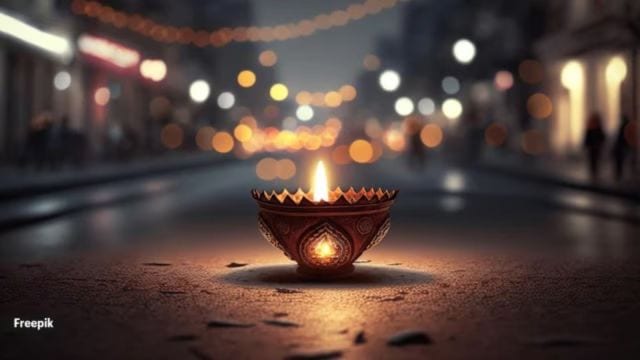
Here’s the truth: I am not a Diwali girl myself. In ’90s Calcutta where I grew up, Diwali was overshadowed by Kali Puja, which the city celebrated on a scale less grand than Durga Puja but splendid nevertheless. Lakshmi was not the goddess we automatically associated with Diwali either; that was Kali, the dark goddess of the glorious night, whose fierce form was imagined as an antithesis to the very features that made Lakshmi so dear: Her beauty, the finery of her clothes and ornaments, the glow of all-round success that radiated from her. (And yet, there was probably some secret strain of philosophical wrangling in Lakshmi too, a startling GenZ thread — why else was she always up and running?)
It was only when I became a bona fide resident of Delhi that I realised that what Durga Puja was to Calcutta, Diwali was to Delhi.
My first Diwali in Delhi was spent in JNU, in the first semester of my MA. We had an exam scheduled the next day, and I sat studying in the reading room on campus — “Dholpur House” the place was called, as a joke, referencing the location of the Union Public Service Commission office, although its architecture, unlike its elegant namesake, was appropriately brutalist. That Diwali evening 20 years ago, one by one, everyone left, even the eager-beaver UPSC aspirants, until I sat there alone, feeling so pleased with myself, with my monastic ardour for the life of the mind, my preference for Saraswati over her glamorous sister. Saurav too was a follower of this path. He would walk me back after I was done studying. Outside, even the façade of the library canteen, closed of course, was twinkling with merry lights, and the very progressive night sky of JNU was streaked with the fireworks. To imagine the festivities from a distance felt more potent than participation.
Later, when we married and set up our first domesticity, this remained our practice. In that extreme youth, we lived in a barsati in a leafy south Delhi colony, and, every Diwali, we placed tea lights on the ledge of the terrace, feeling proud of the tiny flames as they held their own against the over-the-top electric mesh of lights that draped the facades of the mansions on either side. Our Diwali was austere like our lives.
And then, somewhere down the line, like every other high-minded arrogant young person with ideas, we became householders.
This year, I had no time to look for a Diwali story. The traffic was insane; the air deteriorating; we had paid out all the bonuses and ordered the sweets and savouries. We were grownups with roles to play. As I prepared to teach the next day, my eyes were bleary with sleep. If I were a sensible person, I would have briskly scanned the assigned reading — we were going to read a long and lovely autobiographical essay by Ismat Chughtai, where she recounted her “obscenity” trial in Lahore — and retired for the night. Instead, I allowed myself to be struck anew by the sheer genius of Chughtai, her feminist precision and her comic timing. I savoured the stirring power of her prose (translated into English by M Asaduddin), and how laughter, rage, memory and pain can all be woven into the fabric of a text, such that the resulting raiment seems made of light.
That is when I stumble upon the Diwali story.
Chughtai was born in 1915 — and so I assume we are talking about the early 1920s here, about a hundred years ago. A “madcap”, she, perhaps seven or eight years old at the time, demanded that her parents buy earthen lamps for the house.
“Why on earth?” her father asked, genuinely mystified. “For Diwali,” she explained. Lakshmi will be coming.”
“Lakshmi?” he exclaimed, “But we are Muslims.”
“Lakshmi doesn’t know that,” Ismat informed him pertly. “She follows the light. And so, she will see our diyas and come and sit inside!”
He gave instructions for diyas to be bought: This girl will light paper candles otherwise and burn the house down.
The next day is our last in-person class before the Diwali break. We read Chughtai’s essay, we laugh a lot. As my students scribble in their notebooks, they don’t know that I am secretly, silently, weirdly, grownup-ly, sending to them the sum of my old and new Diwalis. Whether they stand apart or participate, may they learn to always follow the light.
Roy is an author and assistant professor of writing at Ashoka University, Haryana